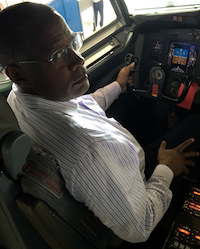
A practical step-by-step guide to becoming an on-air expert on radio and TV
Learn how to define your expertise and get interviewed by newspapers, radio, and television
Are you an expert who wants a wider audience by getting on television and radio? Do you wonder how those "talking heads" you see on television or hear on the radio keep showing up when a big news story happens? Do you want to be one of those people? It takes work to make it happen, but it will be easier if you learn from someone who has been doing it for over 20 years. This 10-day email course lays out the path you can take from being a expert know by some to an expert seen or heard by millions.
Each lesson a short, easy to complete set of tasks that will help you create the tools that you can use for years to come. The upcoming emails will cover the following areas:
- How to prove that you are an expert
- Essential no-cost resources for the modern expert
- Documenting the other resources you have
- Identifying your competition and your possible media outlets
- Learn how to write a sound bite
- Learn how to write an effective Tweet
- Create FAQs for your expertise
- Ordering business cards
- Making your first media contact
- Preparing for your first interview
By the end of this course, you will have all the basic tools and techniques to not only get invited to be interviewed as an on-air expert, but to also confidently present your expertise clearly and concisely.
Your Instructor

I’ve spent most of my career in aviation safety and security, including a career as a safety engineer at Boeing, and have also frequently been interviewed by various broadcast media outlets, often in the wake of serious aviation events. Since I created the airline safety and security site AirSafe.com in 1996, I have interviewed by major radio and television news media outlets and documentary productions in the US and around the world, including CNN, BBC (radio and television), CBS (radio and television), NBC, ABC, NPR, CTV, Fox News, Fox Business, MSNBC, Discovery Channel, History Channel, Al Jazeera, China Radio International, and National Geographic.
What drives me to continue seeking interview opportunities is a desire to provide useful information about aviation safety and security to the general public and to other aviation professionals. Being interviewed by major media outlets has proven to be a very effective way to reach out to a very wide audience.
Frequently Asked Questions
Thanks for taking the time to consider this course. Over the next 10 days, I’ll provide you with what I believe are a set of basic skills that you can use to enhance your skills and your career by communicating directly with the public about your area of expertise.
This will not the only course that I have planned. As other courses become available, one or more of them may be of interest to you, and I would encourage you to check them out. Until then, I’m looking forward to a future where I see or hear you being interviewed.

